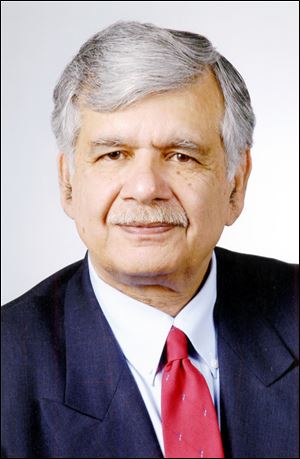
COMMENTARY
Israel-Palestine cycle of violence a death spiral
8/4/2014
Hussain
In the lopsided “war” between Hamas and Israel, more than 1,400 Palestinian lives and more than 50 Israeli lives have been lost at this writing. The toll certainly has gone up by the time you read this.
A cease-fire late last month gave Palestinians a respite from relentless and indiscriminate Israeli bombing of Gaza. They salvaged whatever they could from their destroyed homes, procured food, and searched for their dead in the rubble. The pounding of Gaza continued through the religious holiday of Eid that marks the end of Ramadan.
The coastal strip of Gaza is the size of Detroit and has 1.9 million inhabitants. It is an open-air prison where Israel maintains a total sea, land, and air blockade. Israel decides how much food, medicine, and other necessary items can enter the area.
The Palestine Liberation Organization renounced violence and recognized Israel; Hamas never did. Hamas won a decisive victory in the Palestinian parliamentary elections in 2006, but has remained at odds with Palestinian Authority President Mahmoud Abbas and his Fatah faction.
In a bloody confrontation with Fatah in 2007, Hamas gained control of Gaza. Despite its grass-roots support among Gaza’s population, Israel and the Unites States have refused to talk to Hamas. Because of its militant posture toward Israel, it has been labeled a terrorist organization.
Denied a role in peace negotiations and with its people suffering under the Israeli blockade, Hamas asserts itself by firing crude homemade rockets into Israel. Israel responds by bombing Gaza until it agrees to a cease-fire.
Israel refuses to relax the choke hold. The cycle of violence repeats itself.
Is there an endpoint to the Palestinian-Israeli conflict? There may be other options, but the two-state solution is dead.
Starting with the peace plan developed by U.S. Secretary of State William Rogers in 1970, there have been at least 13 initiatives to find an equitable solution to the conflict. The most recent effort by Secretary of State John Kerry ended up in the same rubbish heap where all previous efforts landed.
The problem is Israel’s refusal to allow a viable Palestinian state within the borders set as a result of the Six-Day War of 1967, when Israel conquered the West Bank and the Gaza Strip, which had been occupied by Jordan and Egypt, respectively. In the meantime, Israel continues a relentless encroachment on Palestinian land and populates it with Jewish settlers.
Political elements in Israel oppose returning any land to Palestinians for peace. They consider all of Palestine — including parts of Egypt, Jordan, and Lebanon — as Eretz Yisrael (Greater Israel), as promised to the Jews in the Bible. Such a bizarre claim would not have a chance in any international court and would summarily be rejected.
Most Israeli governments have followed the policy of populating Palestinian land with Jewish settlers. At the creation of Israel in 1948, David Ben-Gurion, Israel’s first prime minister, said: “The acceptance of partition [of Palestine] does not commit us to renounce Transjordan: One does not demand from anybody to give up his vision.
“We shall accept a state in the boundaries fixed today. But the boundaries of Zionist aspirations are the concerns of the Jewish people and no external factor will be able to limit them.”
One option is for Palestinians to live within Greater Israel. This conclusion was reached by the late Edward Said, a Palestinian-American literary theorist. The question is whether the Jewish state is willing to absorb all Palestinians within Israel and extend them equal rights as citizens.
Another option is to keep Palestinians under the boot in an apartheid system. Such a system, as we saw in South Africa, is not sustainable in the long run.
Some extreme right-wing Israeli politicians advocate ethnic cleansing of all Palestinians. Though they are a minority even among the extremists, few Israelis have condemned their reprehensible views.
Barring any effective resolution of the conflict, we will continue to see daily deprivation and humiliation for Palestinians, and occasional flare-ups and lopsided wars.
Dr. S. Amjad Hussain is a retired Toledo surgeon whose column appears every other week in The Blade.
Contact him at: aghaji@bex.net